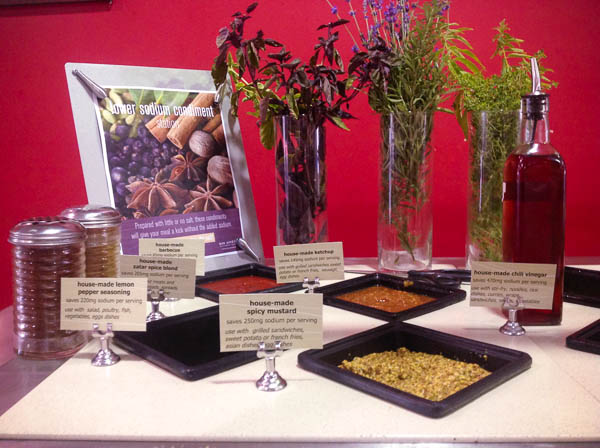BAMCO Asks Chefs, Guests to Shake Their Salty Habits
From-scratch pioneer partners with Center for Science in the Public Interest (CSPI) on national sodium-reduction initiative
Palo Alto, Calif. (October 17, 2013) — Salt. Humans need it to live, but at the levels that Americans currently consume it, sodium is probably the single most dangerous substance in the food supply. Reducing sodium consumption by half would save an estimated 150,000 lives and $20 billion in medical costs per year (PDF).
The consumer advocacy group Center for Science in the Public Interest (CSPI) has made sodium reduction a key focus. In partnership with CSPI, the food service provider Bon Appétit Management Company is extending its pioneering work in healthy cooking and guest education with a three-pronged sodium-reduction campaign at the 500-plus cafés it operates for corporations, universities, and museums in 32 states.
In the weeks leading up to the third annual Food Day — a nationwide celebration of healthy, affordable, and sustainably produced food that culminates on October 24 — Bon Appétit has conducted culinary, purchasing, and education efforts to decrease sodium usage. The culinary team is educating chefs about awareness of taste thresholds and ways to cut salt use in the kitchen, while the purchasing team has identified lower-sodium substitutes for several commonly used ingredients. CSPI is offering an award for those Bon Appétit accounts that take a jointly created Sodium Reduction Pledge, which commits to purchasing certain products and executing specific education training. More than 50 have taken the pledge to date, from Nordstrom headquarters in Seattle to eBay headquarters in San Jose, CA, Medtronic’s offices in Minneapolis, and Roger Williams University in Bristol, RI. And Bon Appétit’s nutrition and marketing teams have devised diner-facing demonstrations and informational displays about how they can reduce their salt intake.
The average American gets over 3,400 mg of sodium a day — way more than they should. The Dietary Guidelines for Americans recommend limiting sodium to 2,300 milligrams a day — or 1,500 mg if you’re age 51 or older, African-American, or have high blood pressure, diabetes, or chronic kidney disease. A single teaspoon of table salt has 2,300 milligrams, but the biggest perpetrator isn’t the salt shaker on the family dinner table. CSPI estimates that more than 75% of Americans’ daily intake comes from processed and restaurant foods.
“At Bon Appétit, we have always believed in giving our chefs the freedom to cook whatever delicious seasonal food they think is right for their guests. Now we’re giving them more tools to make sure those meals are as healthy as they can be,” says Fedele Bauccio, CEO of Bon Appétit Management Company. “Americans have gotten addicted to salt. We have to help our guests adjust their palates.”
“Bon Appétit has been a great partner for Food Day since it began. This sodium-reduction campaign takes its commitment to consumers’ health to a new level,” says Food Day Campaign Manager Lilia Smelkova.. “A company that serves more than 150 million meals a year can really bring change at a massive scale. Because excessive sodium consumption causes so many heart attacks and strokes, I hope that Bon Appétit’s action will spur many other foodservice companies to do the same.”
More about Salt in Bon Appétit’s Kitchens
Since its founding in 1987, Bon Appétit has been committed to cooking from scratch, including stocks and soups. Company guidelines require that these be unsalted, in contrast to the high sodium levels found in canned stock. (Bon Appétit had samples from several of its kitchens analyzed by a lab and found that its house-made stocks averaged only 100 mg sodium per cup versus the 800-plus mg often found in a cup of canned stock.) Its chefs have always taken a light hand with added salt in preparation and focused on ingredients such as fresh herbs and spices to add flavor.
With this strongly salt-conscious culinary foundation, Bon Appétit felt it could go further. As part of the 2013 sodium-reduction campaign with CSPI, Bon Appétit asked its chefs to:
- Stop salting their dishes at multiple preparation stages (for example, not to salt the water for boiling potatoes, pasta, and dried beans; to use marinades or rubs OR add salt to final dishes – not both);
- Reduce added salt when one or more salty ingredient is included in dish;
- Conduct kitchen staff awareness training on personal sodium thresholds and salty ingredients;
- Measure and document a 15% reduction in added salt usage in the kitchen.
Salt-Busting Products
Companywide, Bon Appétit has located lower-sodium ingredients and made them available in its purchasing system for its chefs to order: a deli turkey with no more than 80 mg sodium per ounce (representing a 49% reduction in sodium!); ham with no more than 220 mg/ounce (14% reduction); and canned tuna with no more than 110 mg/ounce (31% reduction). Those accounts taking the CSPI–Bon Appétit Lower-Sodium Pledge also commit to using only low-sodium soy sauce (47% reduction) and that at least half of their canned tomato purchases will be no-salt-added tomato products (93% reduction).
Bon Appétit chefs are also setting up lower-sodium condiment stations with house-made condiments and deli sections offering sandwiches made with sodium levels in mind. (Due to the high levels found in bread, cheeses, cured meats, and condiments, a single typical American deli sandwich often contains more sodium than the entire day’s recommended serving.)
Guest Education
On Food Day, October 24, Bon Appétit teams around the country will host a flurry of diner-facing activities: a “salt busters” display of high-sodium products to avoid, a tasting of a no-salt-added entrée and a lower-sodium condiment station featuring house-made alternatives to ketchup, mustard, barbecue sauce and seasoning blends, which are often high in sodium.
About Bon Appétit Management Company
Bon Appétit Management Company (www.bamco.com) is an on-site restaurant company offering full food-service management to corporations, universities, and specialty venues. Based in Palo Alto, CA, Bon Appétit has more than 500 cafés in 32 states, including eBay, the University of Pennsylvania, and the Getty Center. All Bon Appétit food is cooked from scratch, including sauces, stocks, and soups. A pioneer in environmentally sound sourcing policies, Bon Appétit has developed programs addressing local purchasing, the overuse of antibiotics, sustainable seafood, the food and climate change connection, humanely raised meat and eggs, and farmworker welfare. It has received numerous awards for its work, from organizations including the International Association of Culinary Professionals, the James Beard Foundation, Natural Resources Defense Council, Seafood Choices Alliance, and The Humane Society of the United States.
About the Center for Science in the Public Interest
The Center for Science in the Public Interest (CSPI) is a nonprofit health-advocacy group based in Washington, D.C., that focuses on nutrition and food safety. CSPI is supported largely by the 900,000 U.S. and Canadian subscribers to its Nutrition Action Healthletter and by foundation grants.
CONTACT:
Bonnie Powell, BAMCO Communications Director, [email protected]
Jeff Cronin, CSPI Communications Director, [email protected]

